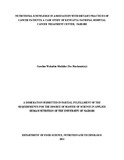| dc.description.abstract | Cancer is on the increase in Kenya and has become one of the leading public health problems.
This increase is possibly attributed to change in behavior and adoption of predisposing lifestyles
such as smoking, alcohol intake, low consumption of fruits and vegetables, high intake of highly
processed foods and lack of physical activity. Cancer patients undergoing treatment such
chemotherapy and radiotherapy experience side effects such as lack of appetite, nausea, vomiting
and diarrhea. This often leads to malnutrition and low immune function, making them even
more predisposed to infections. In this light therefore, cancer patients need nutritional counseling
and education to assist them make prudent dietary choices.
This study was therefore designed to assess the nutritional knowledge and association with
dietary practices of cancer patients. The study cross sectional and involved a sample of 132
patients attending the cancer treatment centre clinic at Kenyatta National Hospital. The study
was carried out in the months of October to November 2012. The patients were either
undergoing chemotherapy or radiotherapy. Information from the patients was collected using a
previously pretested structured questionnaire.
Information was collected on socio demographic, social economic status, nutritional knowledge
and dietary practice. The nutrition knowledge section was divided into Recommended Dietary
Intake, food groups and food choice and diet-disease relationship. Food consumption frequencies
were assessed and data on dietary intake obtained. Results were subjected to analysis as
frequencies, percentages, chi- square tests and linear and logistic regression.
Results showed that of the patients 75% were female and 25% were males. Various patients
(44%) were unemployed others (27%) were farmers. The most prevalent cancer among the
female patients 55% was breast cancer followed by cervical cancer 17% nasal esophagus cancer
at 5% respectively. In males the most prevalent one was prostate (21%), followed by nasal
esophagus 18%, stomach cancer and palate cancer 9% respectively. The age-group that had most
patients at 58% was the middle age (36-59yrs). The education level of patients who were
secondary graduates was 40%, college graduates were at 34%, primary school graduates was at
9% and those who had not gone to school were at 17%. The patients who were unemployed were
44%, those employed were 30% while those who were self-employed were 37%. The average
income for patients attending the clinic was Kshs 9,111.
The total nutrition knowledge average score was 46%.The most frequently consumed foods
included green leafy vegetables, beans, fruits and beef. The average Individual Dietary Diversity
Score (IDDS) was 4 with the most consumed food group being starchy staples (92%).
There was a significant positive correlation between the nutrition knowledge and IDDS of
patients, but nutritional knowledge only influenced the IDDS only up to 3%. Patients with
average to above average Nutrition knowledge were 9 times more likely to consume fruits
compared to those with below average nutrition knowledge. Patients with average and above
average nutritional knowledge were 4 times likely to consume vegetables than those below
average nutritional knowledge.
Results indicate that there was significant positive association between nutritional knowledge of
the patients and their dietary practices especially for foods like fruits and vegetables and protein
foods that are considered crucial in the management of cancers. However, considered on their
own consumption of beans and peas as source of protein showed a negative correlation. | en |

